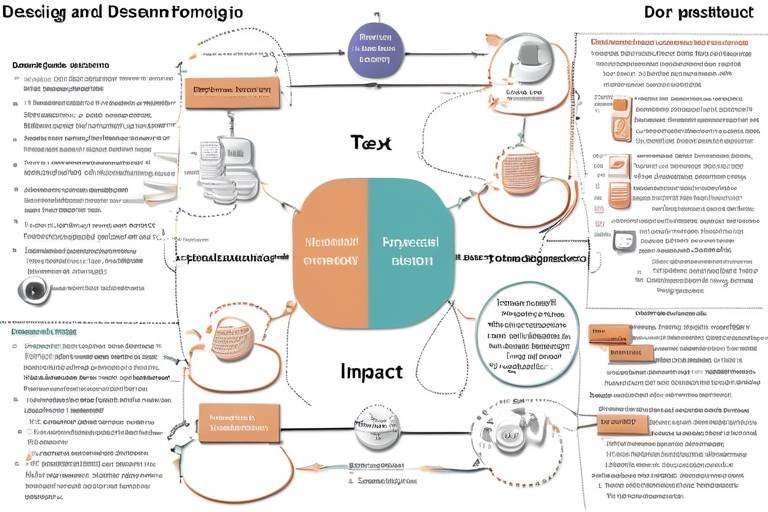Transcending the Ordinary with Ontology
Ontology, at its core, is a fascinating field that invites us to explore the very fabric of existence. It pushes us to ponder profound questions: What does it mean to be? How do we define reality? In a world where our understanding of existence can often feel superficial, ontology serves as a beacon, guiding us through the complexities of life and reality. Imagine standing at the edge of a vast ocean, the waves crashing against the shore, each one a representation of different entities and their relationships. Ontology is the lens through which we can examine these waves, seeking to understand not just their surface, but the depths beneath.
The significance of ontology stretches beyond mere philosophical musings; it has practical implications that resonate in our daily lives. From the way we categorize knowledge to how we perceive relationships and entities around us, ontology shapes our worldview. For instance, think about the way we classify animals. We don't just see them as individual creatures; we understand them within a larger framework of species, habitats, and ecosystems. This hierarchical understanding is fundamentally ontological, as it reflects our grasp of existence and the connections that bind all living things.
Moreover, ontology isn't just an abstract concept confined to dusty books in libraries. It permeates various fields, including science, technology, and even art. In science, ontology helps researchers articulate what entities exist within their studies and how these entities relate to each other. In the realm of technology, particularly in artificial intelligence and data management, ontological frameworks are essential for structuring information, allowing machines to understand and process data in a human-like manner. This intersection of ontology with practical applications highlights its relevance in our modern world.
As we delve deeper into the nuances of ontology, we uncover a rich tapestry of ideas and theories that have evolved over centuries. From the ancient philosophies of Plato and Aristotle to the contemporary discussions that challenge traditional views, ontology has been a dynamic field of inquiry. Each philosophical contribution adds a new layer to our understanding of existence, inviting us to reconsider our assumptions and beliefs.
In summary, ontology transcends the ordinary by encouraging us to question the very nature of reality and existence. It invites us to explore the intricate web of relationships that define our world, pushing us to think critically about what it means to be. As we embark on this journey through the realms of ontology, we not only gain insights into philosophy but also enrich our understanding of ourselves and the universe we inhabit.
- What is ontology? Ontology is the philosophical study of the nature of being, existence, and reality.
- Why is ontology important? It helps us understand the fundamental nature of reality and existence, influencing various fields like science and technology.
- Who are the key figures in ontology? Key figures include ancient philosophers like Plato and Aristotle, as well as modern thinkers who have expanded ontological discussions.
- How does ontology relate to science? Ontology plays a crucial role in scientific inquiry by helping researchers conceptualize entities and their relationships.

The Essence of Ontology
Ontology, at its core, is the study of *being* and *existence*. It seeks to answer profound questions about what it means for something to exist. Imagine standing in front of a beautiful painting; you might wonder, “What makes this painting real?” Is it the canvas, the paint, or the idea behind it? Ontology dives deep into these kinds of questions, exploring the very fabric of reality itself. It examines not just the physical aspects of existence but also the abstract concepts that underpin our understanding of the world.
To grasp ontology, we must familiarize ourselves with some key concepts and terms. One of the fundamental ideas is the distinction between *entities* and their *properties*. An entity is something that exists, while properties are the characteristics or qualities that define that entity. For instance, consider a tree: the tree itself is the entity, while its height, color, and age are its properties. This relationship between entities and their properties is crucial for ontological studies.
Another essential term in ontology is *categories of being*. These categories help us organize our understanding of existence. They can include everything from physical objects to abstract concepts like love or justice. By categorizing different types of being, ontology allows us to make sense of the complexity of the world around us. Here are a few examples of categories that ontologists might explore:
- Concrete entities: Physical objects like rocks, trees, and animals.
- Abstract entities: Concepts such as numbers, ideas, and emotions.
- Social entities: Groups, societies, and institutions.
Understanding these categories is vital because they shape how we perceive and interact with reality. For instance, if we view emotions as mere byproducts of physical processes, we might overlook their significance in our lives. On the other hand, if we see them as essential components of our existence, we might approach our relationships and experiences with a deeper sense of meaning.
Moreover, ontology is not just an academic pursuit; it has practical implications in various fields. In computer science, for example, ontological frameworks help structure data, making it easier for machines to understand and process information. In philosophy, ontological discussions challenge us to reconsider our beliefs about existence, prompting us to question the very nature of reality itself.
In summary, ontology is a rich and multifaceted field that invites us to explore the essence of being. By examining the relationships between entities and their properties, as well as categorizing different types of existence, we can gain a deeper understanding of the world and our place within it. It encourages us to ask the big questions, pushing the boundaries of our knowledge and challenging our perceptions of reality.

Historical Context of Ontology
Understanding ontology requires a look at its historical development, which is as rich and complex as the subject itself. The journey of ontological thought spans centuries, beginning with ancient philosophers who laid the groundwork for what we now consider the essence of being. Imagine stepping into a time machine that whisks you back to ancient Greece, where thinkers like Plato and Aristotle were not just pondering the nature of existence but actively shaping the philosophical landscape that would influence generations to come.
In the early days, ontology was intertwined with metaphysics, a broader field concerned with the nature of reality. It was during this period that foundational ideas emerged, setting the stage for future inquiry. The dialogues of Plato, for instance, introduced concepts that would resonate through the ages, while Aristotle's empirical approach brought a new dimension to understanding existence. Their contributions are not merely historical footnotes; they are the bedrock upon which modern ontological discussions are built.
The roots of ontology can be traced back to ancient Greece, where philosophical inquiry began to take shape. Plato's allegories and dialogues often explored the distinction between the material world and the world of forms—an idea that would profoundly influence later thinkers. He argued that the tangible world we perceive is merely a shadow of a higher reality, the realm of forms, where true knowledge resides. This notion of dualism sparked debates that would last for centuries.
Plato's Theory of Forms posits that non-material abstract forms represent the most accurate reality. For him, these forms are eternal and unchanging, unlike the physical objects we encounter daily. This theory suggests that to understand the essence of anything, one must look beyond its physical manifestation. In modern ontological discussions, this idea continues to provoke thought—how do we distinguish between what is real and what is merely an illusion? Plato's influence is evident in various fields, from art to science, where the quest for underlying truths remains paramount.
On the other hand, Aristotle introduced the concepts of substance and essence, arguing that understanding the nature of being requires examining the properties and relations of entities. He believed that substances are the fundamental realities that make up the world, and each substance has its own essence, which defines what it is. Aristotle's approach was more empirical, focusing on observation and classification, laying the groundwork for future scientific inquiry. His ideas prompted a shift from abstract forms to the concrete realities we engage with daily, creating a rich tapestry of thought that continues to influence ontological studies today.
Fast forward to the modern era, and ontology has expanded to include various perspectives that challenge and refine traditional frameworks. Contemporary thinkers like Martin Heidegger and Jean-Paul Sartre have introduced existential dimensions to ontology, emphasizing the importance of human experience and subjectivity. The evolution of technology and science has also prompted new ontological questions, particularly in fields like artificial intelligence and virtual reality. How do these advancements reshape our understanding of existence? Are digital entities 'real'? These questions highlight the ongoing relevance of ontology in our rapidly changing world.
In summary, the historical context of ontology is a fascinating journey through time, marked by significant milestones and figures. From the profound insights of Plato and Aristotle to the modern debates that challenge our understanding of reality, ontology remains a dynamic field of inquiry. As we continue to explore the essence of being, we are reminded that the questions we ask today echo those posed by our philosophical ancestors.
- What is ontology? Ontology is the philosophical study of the nature of being, existence, and reality.
- Who are the key figures in the history of ontology? Key figures include Plato, Aristotle, Martin Heidegger, and Jean-Paul Sartre.
- How does ontology relate to metaphysics? Ontology is a subset of metaphysics, focusing specifically on the nature of being and existence.
- Why is ontology important in modern science? Ontology helps scientists conceptualize entities and their relationships, influencing fields like artificial intelligence and data management.

Ancient Philosophical Foundations
When we delve into the of ontology, we find ourselves standing on the shoulders of giants—thinkers whose ideas have not only shaped the course of philosophy but also our very understanding of existence itself. The journey begins in ancient Greece, a cradle of intellectual thought, where philosophers like Plato and Aristotle laid the groundwork for what we now consider the core of ontological inquiry.
Plato, with his profound insights, introduced the Theory of Forms, a concept that posits the existence of non-material abstract forms as the truest reality. Imagine, if you will, a world where the shadows of objects on the cave wall represent mere illusions, while the actual objects—the forms—exist in a realm beyond our sensory experience. This notion not only challenges our perception of reality but also invites us to question the essence of what it means to 'be.' Plato's emphasis on these ideal forms has left a lasting impact on ontological discussions, prompting us to explore the nature of universals and particulars.
On the other hand, Aristotle took a different approach, focusing on the concepts of substance and essence. He argued that to truly understand being, one must examine the properties and relationships of entities within the world. For Aristotle, everything that exists can be categorized based on its substance—what it is—and its essence—what it means to be that thing. This duality has profound implications for ontology, as it suggests that our understanding of existence is not merely a matter of abstract thought but is deeply rooted in the tangible world around us.
| Philosopher | Key Contribution | Impact on Ontology |
|---|---|---|
| Plato | Theory of Forms | Introduced the idea of non-material abstract forms as the truest reality. |
| Aristotle | Substance and Essence | Emphasized the importance of examining properties and relations of entities. |
This philosophical groundwork laid by Plato and Aristotle has sparked centuries of debate and exploration. Their ideas resonate through time, influencing not just philosophy but also fields like science, theology, and even modern existential thought. As we navigate through the complexities of ontology today, we find ourselves continually referencing these ancient thinkers, pondering their questions and seeking answers to the mysteries of existence.
In summary, the ancient philosophical foundations of ontology are not merely historical footnotes; they are the bedrock upon which much of Western philosophy is built. As we explore the evolution of ontological thought, it becomes clear that understanding being and existence is an ongoing journey—a quest that invites us to reflect on our own reality and the essence of our being.
- What is ontology? Ontology is the branch of philosophy that studies the nature of being, existence, and reality.
- Who were the key figures in ancient ontology? Key figures include Plato and Aristotle, whose ideas significantly shaped ontological thought.
- How does ontology relate to modern science? Ontology influences scientific inquiry by shaping how researchers conceptualize entities and their relationships.
- What are the main challenges in ontological inquiry? Challenges include debates over definitions, the nature of reality, and differing perspectives on existence.

Plato's Theory of Forms
Plato's Theory of Forms is a fascinating and profound concept that has shaped philosophical thought for centuries. At its core, this theory posits that beyond our tangible, physical world lies a realm of abstract, non-material forms or ideas, which represent the most accurate reality. Imagine a perfect circle; while you can draw one, it will never be flawless. In Plato's view, the perfect form of a circle exists in a higher realm, untouched by the imperfections of the physical world. This idea introduces a dualistic view of reality, where the material world is merely a shadow of the true essence of things.
According to Plato, these forms are eternal and unchanging, unlike the objects we encounter in our daily lives, which are subject to decay and transformation. He believed that knowledge of these forms is essential for understanding the true nature of reality. For instance, consider the concept of beauty. While we can observe beautiful things, such as a sunset or a piece of art, these are merely reflections of the ultimate form of beauty that exists beyond our perception. This leads to the question: how do we access this realm of forms? Plato suggested that through philosophical reasoning and dialectic methods, we can ascend from the world of appearances to the world of reality.
Plato's Theory of Forms has significant implications for various fields, including ethics, politics, and metaphysics. It emphasizes the importance of ideals and encourages individuals to strive for the higher truths that govern existence. However, this theory is not without its criticisms. Many philosophers argue that the existence of these abstract forms is difficult to substantiate. For example, if the form of a horse exists, what does it mean for a horse to be a horse? Is it merely a collection of its properties, or does it possess an essence that transcends those properties?
Furthermore, Plato's ideas have sparked extensive debates regarding the nature of reality and our understanding of it. To illustrate the impact of his theory, let's consider a simple table:
| Aspect | Plato's View | Critics' View |
|---|---|---|
| Nature of Reality | Dualistic: Forms vs. Physical | Monistic: Only the physical is real |
| Accessibility of Knowledge | Through philosophical reasoning | Empirical observation is key |
| Existence of Forms | Real and eternal | Abstract concepts without independent existence |
In conclusion, Plato's Theory of Forms invites us to think deeply about the nature of existence and the pursuit of knowledge. It challenges us to look beyond the surface and seek the underlying truths that shape our understanding of the world. While it has its share of critiques, the theory remains a cornerstone of philosophical inquiry, encouraging a quest for a deeper understanding of reality.
- What is Plato's Theory of Forms? It posits that non-material abstract forms represent the most accurate reality, beyond our physical world.
- How do we access these forms? Through philosophical reasoning and dialectic methods, according to Plato.
- What are some criticisms of this theory? Critics argue that the existence of abstract forms is difficult to substantiate and that empirical observation is key to understanding reality.

Aristotle's Substance and Essence
When we dive into the depths of Aristotle's philosophy, we encounter the profound concepts of substance and essence. Aristotle, often hailed as the father of Western philosophy, introduced these ideas as fundamental to understanding the nature of being. But what exactly do these terms mean, and why are they so pivotal in the realm of ontology?
At its core, Aristotle's notion of substance refers to that which exists independently and is the primary reality. Think of it as the 'stuff' of the universe. For Aristotle, substances are not just physical objects; they encompass everything that can exist on its own. This includes not only tangible items, like a tree or a rock, but also abstract entities, such as numbers or concepts. In essence, substances are the building blocks of reality, the entities that populate our world.
Now, let’s break down the idea of essence. Essence, according to Aristotle, is what makes a substance what it is. It is the defining characteristic that gives an entity its identity. For instance, consider a dog. Its essence might include traits like being a mammal, having four legs, and being capable of barking. Without these essential traits, the entity would not be recognized as a dog. In a way, essence is the blueprint that outlines the necessary features of a substance.
To illustrate this further, let’s use a simple analogy. Imagine you have a recipe for a cake. The ingredients—flour, sugar, eggs—are like substances; they exist independently. However, the specific combination and proportions of these ingredients define the cake’s essence. Without the right mix, you may end up with something that doesn’t resemble a cake at all. Similarly, in Aristotle's framework, understanding a substance requires grasping its essence.
Aristotle also distinguished between different types of substances. He categorized them into two primary groups: primary substances and secondary substances. Primary substances are individual entities, like a specific person or a particular tree, while secondary substances refer to the species or genera to which these primary substances belong. This distinction is crucial in ontology, as it helps clarify how we categorize and understand the world around us.
| Type of Substance | Description |
|---|---|
| Primary Substance | Individual entities that exist independently (e.g., a specific dog). |
| Secondary Substance | Categories or groups to which primary substances belong (e.g., the species 'dog'). |
Another fascinating aspect of Aristotle's thought is his concept of potentiality and actuality. He argued that substances have the potential to change and develop into different states. For example, a seed has the potential to become a tree. This potentiality is tied to the essence of the substance, as it defines what the substance can become. In contrast, actuality is the realization of that potential. When the seed grows into a tree, it has achieved its actual state.
In summary, Aristotle's exploration of substance and essence provides a rich framework for understanding the nature of reality. By distinguishing between what something is (its essence) and what it is made of (its substance), Aristotle lays the groundwork for centuries of philosophical inquiry. His ideas continue to resonate in contemporary discussions, reminding us that the quest for knowledge is as much about understanding the essence of things as it is about identifying them.
- What is the difference between substance and essence?
Substance refers to the actual entity that exists, while essence refers to the defining characteristics that make that entity what it is. - How did Aristotle's ideas influence modern philosophy?
Aristotle's distinctions between substance and essence have shaped various philosophical discussions, particularly in metaphysics and ontology, influencing how we categorize and understand reality. - What are primary and secondary substances?
Primary substances are individual entities that exist independently, while secondary substances are the categories or groups to which these primary substances belong.

Modern Ontological Perspectives
In the ever-evolving landscape of philosophy, have emerged as critical frameworks that challenge traditional notions of being and existence. As we navigate through the complexities of the 21st century, thinkers have begun to question not just what it means to exist, but how our understanding of existence is shaped by culture, technology, and even our own consciousness. This exploration is not just an academic exercise; it has profound implications for how we perceive reality itself.
One of the most significant developments in modern ontology is the shift from a purely metaphysical approach to a more pragmatic perspective. Thinkers like Martin Heidegger and Jean-Paul Sartre have emphasized the importance of human experience and the context in which existence unfolds. For instance, Heidegger's concept of "Being-in-the-world" suggests that our existence is inherently tied to our interactions with the world around us. This perspective invites us to consider how our relationships, environments, and even our emotions shape our understanding of what it means to be.
Moreover, contemporary ontological discussions increasingly incorporate insights from science and technology. The rise of digital culture has prompted philosophers to rethink the nature of existence in a world where virtual realities and artificial intelligence challenge our traditional notions of being. Thinkers like Nick Bostrom have posited that we may be living in a simulation, raising questions about the very fabric of reality. This notion can feel disorienting, but it also opens up a rich field of inquiry about the nature of consciousness and existence in a digital age.
Furthermore, feminist and postcolonial theorists have contributed to modern ontology by challenging Eurocentric perspectives and emphasizing the importance of diverse experiences. They argue that our understanding of being must account for the multiplicity of voices and histories that exist in the world. This inclusivity is not just an ethical stance; it fundamentally alters our ontological frameworks by recognizing that existence is not a one-size-fits-all concept. Instead, it is a tapestry woven from various cultural, social, and personal threads.
As we delve deeper into modern ontological perspectives, we find ourselves grappling with a multitude of questions: What does it mean to exist in a world increasingly dominated by technology? How do our identities shape our understanding of being? And, importantly, how do we reconcile the abstract nature of existence with the tangible realities of our lives? These questions are not merely philosophical musings; they are essential inquiries that resonate with our lived experiences.
In summary, modern ontology is a vibrant field that invites us to explore the complexities of existence from multiple angles. It combines traditional philosophical inquiry with contemporary challenges and insights, making it a relevant and dynamic area of study. As we continue to engage with these ideas, we find that ontology is not just about understanding what it means to be; it's about embracing the rich, multifaceted nature of our reality.
- What is ontology? Ontology is the branch of philosophy that studies the nature of being, existence, and reality.
- How has modern ontology changed? Modern ontology has evolved to incorporate insights from science, technology, and diverse cultural perspectives.
- Who are some key figures in modern ontology? Notable modern ontologists include Martin Heidegger, Jean-Paul Sartre, and Nick Bostrom.
- Why is ontology important? Ontology helps us understand the fundamental nature of reality, which can influence various fields, including science, technology, and ethics.

Ontology in Science
Ontology is not just a philosophical concept; it plays a crucial role in the realm of science as well. When scientists embark on their quest for knowledge, the questions they ask often lead them to delve into the very nature of existence and reality. What does it mean for something to exist in the scientific world? How do we categorize and understand the entities we study? These are not just philosophical musings; they are foundational questions that shape scientific inquiry.
In scientific contexts, ontology helps researchers clarify their assumptions about the entities they are investigating. For example, consider the field of biology. When biologists study living organisms, they must first define what constitutes a "living being." Is it merely the presence of certain biological processes, or does it involve something more profound? By establishing a clear ontology, scientists can create a framework that guides their research, ensuring consistency and coherence in their findings.
Moreover, ontology extends its influence into various scientific paradigms, including physics, chemistry, and even social sciences. Each discipline requires a unique ontological framework to address its specific questions. For instance, in physics, the ontology of particles and waves leads to different interpretations of reality, while in social sciences, the ontology of human behavior and societal structures informs theories and methodologies. This interplay between ontology and scientific disciplines illustrates the complexity and richness of how we understand the world around us.
Furthermore, the advent of technology has introduced new challenges and opportunities for ontological inquiry in science. With the rise of artificial intelligence and big data, scientists are now tasked with defining not just physical entities but also abstract concepts and relationships. This is where ontology becomes indispensable. It helps in structuring knowledge, ensuring that data is organized in a way that makes it accessible and meaningful. For example, in information science, ontologies are used to develop taxonomies that categorize information, making it easier to retrieve and analyze.
To sum it up, ontology in science is not merely an academic exercise; it is a vital tool that shapes our understanding of reality. By providing a framework for categorizing and interpreting entities, ontology allows scientists to navigate the complexities of their respective fields. The questions of existence and reality are not just philosophical debates; they are at the heart of scientific exploration and discovery.
- What is ontology in science? Ontology in science refers to the study of the nature of existence and the categorization of entities within scientific disciplines. It helps clarify assumptions and frameworks that guide research.
- How does ontology influence scientific inquiry? Ontology influences scientific inquiry by providing a structured approach to defining and categorizing entities, ensuring consistency in research findings across various disciplines.
- Why is ontology important in fields like artificial intelligence? In artificial intelligence, ontology is crucial for structuring knowledge and data, enabling better information retrieval and analysis, and ensuring that AI systems can understand and process information effectively.

Ontology and Metaphysics
When we dive into the realms of ontology and metaphysics, we find ourselves navigating a complex landscape where the very fabric of reality is examined. At first glance, these two fields might seem interchangeable, but they each hold distinct yet intertwined roles in philosophical inquiry. Ontology, the study of being and existence, asks the fundamental questions: What exists? What does it mean for something to be? On the other hand, metaphysics delves deeper into the nature of reality itself, exploring the principles and structures that govern existence.
To illustrate their relationship, consider ontology as the foundation of a house, while metaphysics serves as the blueprint. The house (ontology) stands firm on its own, comprising various entities and their relationships, but without the blueprint (metaphysics), understanding how those entities interact and the principles that govern them becomes challenging. This analogy emphasizes that while ontology provides a catalog of what exists, metaphysics seeks to explain why it exists and the nature of those existences.
One of the key discussions in this relationship revolves around the concept of substance. In metaphysical terms, substance refers to what something fundamentally is, while ontology categorizes different kinds of substances. For instance, consider the distinction between physical objects and abstract entities like numbers or ideas. Ontology helps us classify these entities, while metaphysics helps us understand their nature and how they relate to one another.
Moreover, ontology and metaphysics often grapple with the same questions but from different angles. For example, when we ask, “Do abstract objects like numbers exist?” ontology would categorize numbers as abstract entities, while metaphysics would explore the implications of their existence. This leads to fascinating debates among philosophers, such as whether numbers are discovered or invented, which can significantly influence our understanding of reality.
As we navigate through these philosophical waters, we also encounter various schools of thought that have emerged over time, each contributing unique perspectives to the ontology-metaphysics dialogue. Some modern thinkers argue for a more pragmatic approach, suggesting that our understanding of existence should be informed by practical consequences rather than abstract theorizing. Others lean towards a more traditional viewpoint, emphasizing the importance of rigorous definitions and logical consistency.
In essence, ontology and metaphysics are like two sides of the same coin—each enriching our understanding of the other. They challenge us to think critically about existence, reality, and the very essence of being. As we continue to explore these profound questions, we may find that the answers are not just academic; they resonate deeply with our everyday experiences and shape our worldview.
- What is the difference between ontology and metaphysics? Ontology focuses on the nature of being and existence, while metaphysics explores the principles and structures that underlie reality.
- How do ontology and metaphysics relate to each other? Ontology provides a framework for understanding what exists, whereas metaphysics seeks to explain the nature and relationships of those existences.
- Can ontology exist without metaphysics? While ontology can stand alone, a complete understanding of existence often requires metaphysical insights to explain the underlying principles.
- Are there modern perspectives on ontology and metaphysics? Yes, contemporary thinkers often adopt pragmatic approaches that emphasize practical implications over traditional abstract theorizing.

Ontology in Information Science
In the digital age, where information flows like a river and data is the new gold, ontology emerges as a vital framework for structuring knowledge. But what exactly does that mean? At its core, ontology in information science helps us define the types of entities within a domain, their properties, and the relationships between them. Imagine trying to navigate a vast library without a catalog or a map; that's what working with data feels like without a well-structured ontology. It provides the necessary backbone to make sense of complex information systems.
One of the most significant applications of ontology is in the realm of artificial intelligence (AI). AI systems rely on ontological frameworks to understand and process information. For instance, in natural language processing, ontologies help machines grasp the meaning behind words and phrases by defining how they relate to each other. This relationship mapping allows AI to interpret context and respond intelligently, much like how humans understand language through shared knowledge.
Moreover, ontology plays a crucial role in data management. In a world overflowing with data, organizations must categorize and organize this information effectively. Ontologies provide a standardized vocabulary that enables different systems to communicate seamlessly. This is particularly important in fields such as biomedical research, where diverse datasets must be integrated to produce meaningful insights. By employing ontologies, researchers can ensure that their data is not only consistent but also interoperable across various platforms.
To illustrate the impact of ontology in information science, consider the following table that outlines its primary benefits:
| Benefit | Description |
|---|---|
| Enhanced Data Interoperability | Facilitates seamless communication between different data systems. |
| Improved Knowledge Representation | Defines entities and their relationships, making complex data easier to understand. |
| Increased Efficiency | Streamlines data retrieval and processing, saving time and resources. |
| Facilitated AI Development | Provides a framework for AI systems to learn and understand contextual relationships. |
In addition to these benefits, ontologies are foundational in the development of semantic web technologies. By utilizing ontologies, web developers can create more intelligent and responsive web applications. The semantic web aims to make internet data machine-readable, allowing for more sophisticated search capabilities and personalized user experiences. Think of it as upgrading from a basic search engine to a smart assistant that understands your preferences and anticipates your needs.
However, the integration of ontology in information science is not without challenges. As the amount of data continues to grow exponentially, maintaining and updating ontological frameworks can become a daunting task. Furthermore, the need for consensus on ontological standards can lead to debates among experts, complicating the implementation process. Despite these hurdles, the potential benefits of ontology in enhancing data management and AI capabilities make it an exciting area of study.
In conclusion, ontology in information science is more than just an abstract concept; it is a practical tool that shapes how we interact with data and technology. By providing a structured approach to understanding entities and their relationships, ontology empowers researchers, developers, and organizations to harness the full potential of their information resources.
- What is ontology in information science?
Ontology in information science refers to the structured framework that defines the types of entities, their properties, and the relationships between them within a specific domain. - How does ontology benefit artificial intelligence?
Ontology helps AI systems understand and process information by defining relationships between words and concepts, enabling machines to interpret context and respond intelligently. - What role does ontology play in data management?
Ontology provides a standardized vocabulary that facilitates data interoperability, improving the organization and categorization of vast amounts of information. - Are there challenges associated with ontology?
Yes, maintaining and updating ontological frameworks can be challenging, especially as data grows. Additionally, achieving consensus on standards can lead to debates among experts.

Challenges in Ontological Inquiry
Ontology, despite its profound significance, is not without its challenges. One of the primary issues is the sheer complexity of definitions. Different philosophers and schools of thought have proposed varying interpretations of what it means for something to "be." This divergence can lead to confusion and miscommunication, especially for those new to the subject. For instance, while some may argue that existence is merely a matter of perception, others may contend that it is an objective reality independent of our awareness. This fundamental disagreement creates a philosophical minefield that can hinder productive discourse.
Another challenge lies in the relationship between ontology and language. Language is inherently limited, and the words we use to describe our understanding of existence can often fall short. Consider the term "entity"—it can refer to anything from a physical object to an abstract concept. This ambiguity complicates ontological discussions, as philosophers must navigate the intricate web of language to convey their ideas accurately. Furthermore, the evolution of language over time adds another layer of complexity, as terms may shift in meaning, leading to further misunderstandings.
Additionally, the intersection of ontology with science presents its own set of challenges. While ontology seeks to explore the nature of being, scientific inquiry often focuses on empirical evidence and observable phenomena. This can create tension between philosophical and scientific perspectives, particularly when it comes to concepts like quantum mechanics or the nature of consciousness. For instance, the idea that particles can exist in multiple states simultaneously challenges traditional ontological views of existence. As science continues to evolve, so too must our ontological frameworks, leading to ongoing debates about the nature of reality.
Moreover, the subjectivity of human experience poses a significant hurdle in ontological inquiry. Our perceptions and interpretations of the world are influenced by a myriad of factors, including culture, personal experiences, and cognitive biases. This subjectivity can lead to a fragmented understanding of existence, as individuals may arrive at vastly different conclusions based on their unique perspectives. Philosophers must grapple with this variability, striving to create a cohesive ontological framework that accounts for both objective realities and subjective experiences.
Lastly, the impact of technology on our understanding of existence cannot be overlooked. In an age where virtual realities and artificial intelligence blur the lines between what is real and what is not, ontological inquiries are forced to adapt. Questions arise about the nature of digital entities and whether they possess any form of existence comparable to physical beings. This technological evolution challenges traditional ontological categories and compels philosophers to reconsider the implications of existence in a digital age.
Given these challenges, it is evident that ontological inquiry is a dynamic and evolving field. Philosophers must remain open to new ideas and perspectives, continually refining their understanding of existence in light of emerging debates and discoveries. As we navigate the complexities of ontology, we must embrace the uncertainty and ambiguity that come with exploring the very essence of being.
- What is ontology? Ontology is the branch of philosophy that studies the nature of being, existence, and the categories of being.
- Why is ontology important? It helps us understand the fundamental aspects of reality and existence, influencing various fields such as science, information technology, and metaphysics.
- What are some challenges in ontology? Challenges include the complexity of definitions, the relationship between language and ontology, the intersection with science, the subjectivity of human experience, and the impact of technology.
Frequently Asked Questions
- What is ontology?
Ontology is the branch of philosophy that studies the nature of being, existence, and reality. It seeks to answer fundamental questions about what entities exist and how they can be categorized and related to one another.
- How does ontology differ from metaphysics?
While ontology focuses specifically on the nature of being and existence, metaphysics encompasses a broader range of philosophical questions, including the nature of reality, causation, and the universe as a whole. In simpler terms, ontology is a subset of metaphysics.
- Why is ontology important in philosophy?
Ontology is crucial in philosophy because it lays the groundwork for understanding how we perceive reality. By exploring the concepts of existence and categorization, ontology influences other philosophical disciplines, such as epistemology and ethics.
- What are some key figures in the history of ontology?
Some of the most significant figures in the history of ontology include ancient philosophers like Plato and Aristotle, who established foundational concepts. In modern times, thinkers such as Martin Heidegger and W.V.O. Quine have contributed to contemporary ontological discussions.
- How does ontology relate to science?
Ontology plays a vital role in scientific inquiry by shaping how researchers conceptualize entities and their relationships. It helps in the formulation of theories and models, influencing areas such as artificial intelligence and data management.
- What challenges does ontology face today?
Ontology faces several challenges, including debates over definitions of existence, the nature of reality, and the implications of scientific discoveries. These discussions are vital for refining ontological theories and their application in various fields.



















